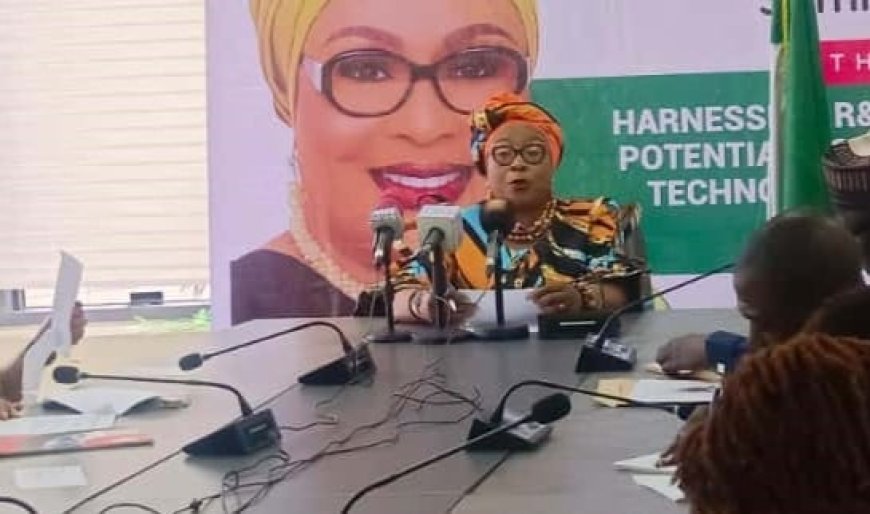NOTAP moves to curb hidden tech transfers, achieves 70% compliance

The Director-General of the National Office for Technology Acquisition and Promotion, Obiageli Amadiobi, says the agency has achieved 70 per cent compliance from multinational firms operating in Nigeria on the registration of their technology transfer agreements.
Amadiobi, who disclosed this during a press conference on Friday in Abuja to announce the forthcoming NOTAP Technology and Innovation Summit 2025, said some companies were still “hiding their technologies,” particularly in non-physical, backend systems used for production and data operations.
According to her, some foreign companies still withhold crucial technical details and backend systems in violation of Nigeria’s technology transfer regulations
She said, “We have started seeing results. At least 70 per cent of the companies are now complying. But there are still a few hiding their technologies, and not all technologies are physical. Some are backend systems that we have uncovered through our auditors.”
A technology transfer agreement is a legal contract between a foreign company (technology owner) and a local company or institution (technology recipient) that allows the local entity to use the foreign firm’s technical knowledge, patents, trademarks, production methods, or software systems for commercial purposes in Nigeria.
Although the rule is still being flouted, the DG said the agency, in partnership with the Central Bank of Nigeria, has achieved about 70 per cent compliance among firms that remit funds abroad for technology services without proper certification.
“Banks have now been mandated to ensure that no company remits money for technology-related transactions without obtaining a notarised certificate from NOTAP. This collaboration has significantly improved compliance,” she added.
Amadiobi announced that the NOTAP Technology and Innovation Summit will hold on Thursday, November 6, and Friday, November 7, 2025, in Lagos.
With the theme “Harnessing R&D and Innovation Potentials of Nigeria’s STI Ecosystem,” the two-day event will bring together leaders from government, academia, development partners, investors, and startups to deliberate on strategies to deepen Nigeria’s science, technology, and innovation ecosystem.
“The summit will serve as a strategic platform to strengthen dialogue and action around innovation policy, technology transfer, intellectual property, and commercialisation,” the DG said.
“Our goal is to accelerate the transformation of research and creativity into commercially viable enterprises that drive national development.”
Highlights of the event will include keynote addresses by ministers and industry experts, panel sessions on technology transfer and artificial intelligence readiness, and the unveiling of Project NOVA (Nigeria’s Outsourcing Value Acceleration).
Also planned are workshops on IP management, funding access, and talent development, as well as innovation exhibitions, hackathons, and startup pitch showcases.
The NOTAP boss criticised some foreign firms operating in Nigeria for using local raw materials while relying on imported technologies and research support from abroad, rather than establishing laboratories within the country.
She cited the palm oil sector as an example, revealing that Nigerian firms were importing palm seedlings from Cameroon and Côte d’Ivoire, even though the plantations and raw materials were located in Nigeria.
“It is very pathetic,” Amadiobi lamented. “When we visited Cameroon and the Ivory Coast, we saw where they prepare palm seedlings for the Nigerian market. These firms use our land and our raw materials but have no research labs here.”
She disclosed that NOTAP would, in the coming weeks, summon the management of affected firms to ensure they establish laboratories locally, a move she said could save Nigeria significant foreign exchange.
Amadiobi also reiterated the agency’s commitment to implementing the Local Vendor Policy across all sectors, saying the initiative was already yielding success in the ICT space.
“Through the LVP, we have achieved about 90 per cent success in ICT,” she said. “Nigerian developers are now exporting locally built applications, including banking software. We want to replicate that success in other sectors.”
She emphasised that the forthcoming summit would also serve as a platform to connect innovators and startups with financial institutions such as the Bank of Industry, noting that NOTAP was finalising a support package for startups registered with the agency.
However, she clarified that not all inventions qualify as innovations worthy of national recognition.
If someone presents us with bottled water branded differently, that’s not innovation, it’s imitation,” she said. “Only original, impactful ideas will be showcased at the summit

 admin
admin 


